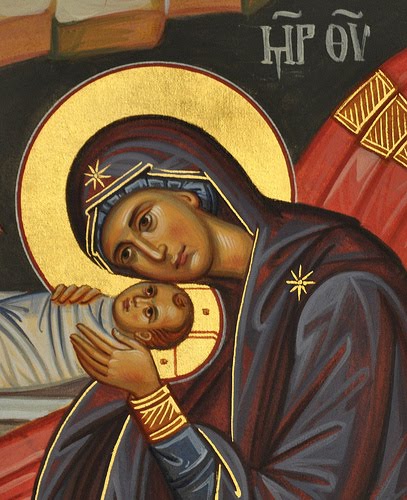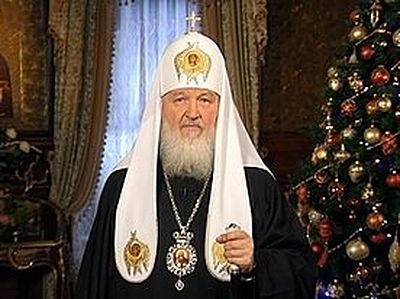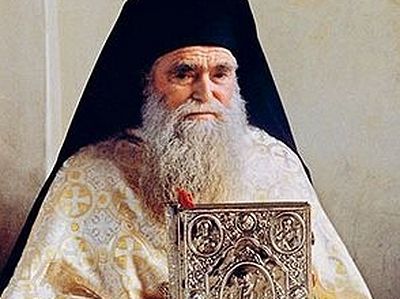Source: Notes on Arab Orthodoxy
December 4, 2015

Christianity believes that Jesus Christ is the pre-existent Word of God and that He Himself took a body from the Virgin Mary and became perfect man without abandoning His divinity: "That which was from the beginning, which we have heard, which we have seen with our eyes, which we have looked upon, and our hands have handled" (1 John 1:1). From its founding, the Church has combated heresies and innovations that claimed that Christ did not take a real body, but rather "an appearance of a body" or "a semblance of a body."
The issue of the incarnation has occupied a distinguished place in Christian-Muslim debate (and dialogue), both ancient and modern. It is still, in the present day, at the top of the list of theological problems on which Christianity and Islam cannot find points of agreement. To say that the Word of God became incarnate as a human being and that the Word is perfect God and perfect man, is not palatable to Islamic thought, which regards the Qur'an as the pre-eternal, uncreated speech of God. Christianity, on the other hand, says that since Christ is the incarnate Word of God, the fullness of divinity dwelled in Him bodily.
When they discuss the incarnation of the Word, Arab Christian writers are in agreement that the incarnation is the fruit of divine generosity. The philosopher Abu Zakariyya Yahya ibn Adi al-Suryani al-Tikriti (d. 974) says, "The most excellent of those who are generous is the one who is generous with the most excellent things in existence. The most excellent thing in existence is the being of the Creator. So it was necessary for the Creator to generously give Himself to us, and this was through His connecting to us." God, who is not only generous but the most excellent of those who are generous, must give Himself generously because that is the best thing in existence. Therefore, He generously bestowed Himself upon human nature, honoring it and raising it up to the divine presence, uniting to it when He became man.
Theodore Abu Qurrah, the 9th century Orthodox bishop of Harran, states that the first reason for the incarnation is for God to draw near to man so that man might be able to come to know God. The second reason, which is no less important, is to redeem man and save him from the devil's grip. For this reason, "God sent His Word and His Spirit to the pure virgin Mary and she bore the light of God which is of God and He appeared incarnate (...) and the Word of God came to be in the likeness of man, without sin, even as He is divine. Christ is the Word of God and His Spirit [this is a deliberate echo of an expression from the Qur'an]. He is of His essence and substance-- Creator, not creature."
Ammar al-Basri, a writer of the 9th century, believes that the incarnation is God's honoring man. He says, "God's generosity, honor, goodness and mightiness, which called Him to bring forth out of nothing, establish and create, are what finally called Him to perfect His charity through His becoming incarnate as a human from His creation. This caused for humankind by His becoming incarnate as a human the lot of His sonship and the sublimity of His lordship." Therefore, the Word has taken a body and through addressed people directly because human nature is the best place for the divine to be revealed. Ammar believes that the incarnation of the divine Word is "the most fitting to God's excellence and generosity and is a clearer expression of His generosity towards them and His honoring them than His appearance (in the Old Testament) in a house of stone, an ark of wood, a lowly bush, and a cloud."
As for Paul, the 13th century Orthodox bishop of Sidon, he regarded the incarnation as the best way that God chose in order to connect to man and to transmit the heavenly message to him. He says, "Because God is generous, it was necessary for Him to be generous with the most sublime thing in existence. There is nothing more sublime than His Word, that is, His reason. Therefore, it was necessary that He be generous with His word, so that He would be the most generous of those who are generous. Thuis it was necessary for Him to take on a tangible being in order to show His power and generosity through it. Since among the creatures there was none nobler than man, He took on human nature from the purified Lady Mary, chosen over all the women of the world."
The Arab Christian writers criticize those who reject belief in the incarnation of the Word and regard the position of those who reject it as stemming from the miserliness with which man responds to God's generosity. In this regard, Yahya ibn Adi says, "If his connecting with us is possible, if we have in it the ultimate honor, and if He has in it the perfection of generosity, then nothing could prevent it apart from inability or miserliness. These two things are attributes of imperfection and He is greater than such things. Therefore He must connect to us." Ammar al-Basri presents the same proof when he says, "Why are do withhold from your your Creator that He bring you to the apex of His generosity and His honor-- though it does not diminish His kingship and authority, just as it does not diminish His honor that He has offered you-- as though you want to make Him your equal in miserliness?"
According to Christian theology, Christmas, which we are making are pilgrimage towards, is the feast of the divine incarnation. The most beautiful gift that God has honored us with is His only-begotten Son, who was born in a lowly manger for animals. Those to whom the gift was first sent rejected it, apart from a very tiny few. In the icon of the Nativity, we see a bull and a donkey surrounding the baby Jesus to warm Him. They symbolize the prophecy from the Old Testament, "The ox knows its owner and the donkey its master’s crib; but Israel does not know, My people do not consider” (Isaiah 3:1). Be generous, just as God is generous. That is the feast.



